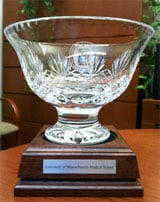 |
|
|
The Office of Faculty Affairs documents five years of accomplishment in its final report on the UMMS $250,000 ACE/Sloan Award for Faculty Career Flexibility. |
Faculty at UMass Medical School are reaping the benefits of enhanced mentoring and career development resources, thanks in part to a prestigious Alfred P. Sloan Award for Faculty Career Flexibility received by the institution five years ago. UMMS was one of only five medical schools in the country to receive the $250,000 grant from the American Council on Education (ACE) and the Alfred P. Sloan Foundation, which was awarded to medical schools that are demonstrating practices that provide unbiased opportunities for work–life balance.
A final report published by the Office of Faculty Affairs documents the faculty programs that have been added since the grant was initiated.
“The Faculty Career Flexibility Award granted to UMMS has had a transformative impact on the Office of Faculty Affairs and provided great benefit to the faculty of UMMS,” said principal investigator Luanne Thorndyke, MD, vice provost for faculty affairs and professor of medicine. “Most broadly, our goal has been to enhance the mentoring culture at UMMS through multiple initiatives.”
Newly developed resources include programs that expand options for faculty development across the full span of careers. For example, the Peers for Promotion program provides mentoring for junior faculty seeking promotion to associate professor. It has helped 72 percent of participants in the first two years of the program achieve the promotion, compared to a rate of 35 percent for nonparticipants.
Partnerships to establish mentoring programs with the Departments of Pediatrics and Family Medicine & Community Health have matched more than 60 junior and midcareer faculty with senior faculty. An evaluation of the family medicine mentoring launch showed that 90 percent of mentees and mentors indicated moderate to high levels of satisfaction with the program and 94 percent of mentees reported that participation helped them advance their careers.
Part-time employment and retirement were two key components of faculty career flexibility that were identified by surveys funded by the grant. In response to these findings, Faculty Affairs developed guidelines for part-time faculty employment and a comprehensive transition through retirement program.
Other initiatives established under the grant include the Vitality Awards used to promote academic vitality; career development and rejuvenation; and a comprehensive onboarding program for new faculty.
“We have achieved cultural and organizational change in critical areas that affect the working lives of our faculty.” Said Dr. Thorndyke. “I would like to thank our UMMS leadership, Provost Flotte and Chancellor Collins, for their guidance and support throughout the grant period—as well as the chairs and program directors for their support of the faculty.”
Complete information about ACE/Sloan Career Flexibility Award initiatives and the many resources for UMMS faculty development is available at the Work Life and Career Flexibility page of the Office of Faculty Affairs website.
Related stories on UMassMedNow:
UMMS receives award for faculty work-life balance efforts
UMass Medical School Faculty Vitality Award recipients announced
UMMS advances a national model for faculty development across the career life cycle
Thorndyke receives Carole J. Bland Phronesis Award from AAMC